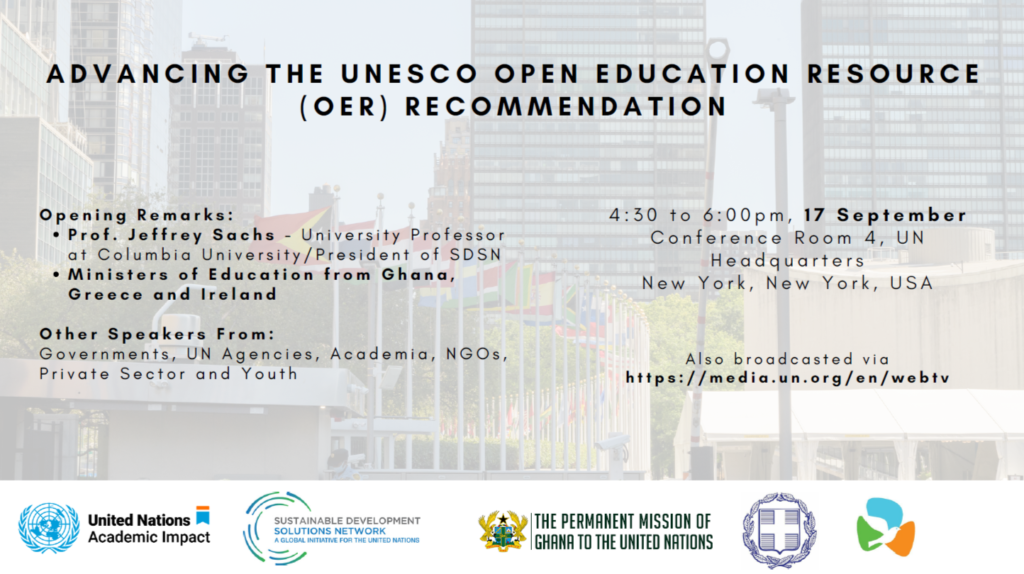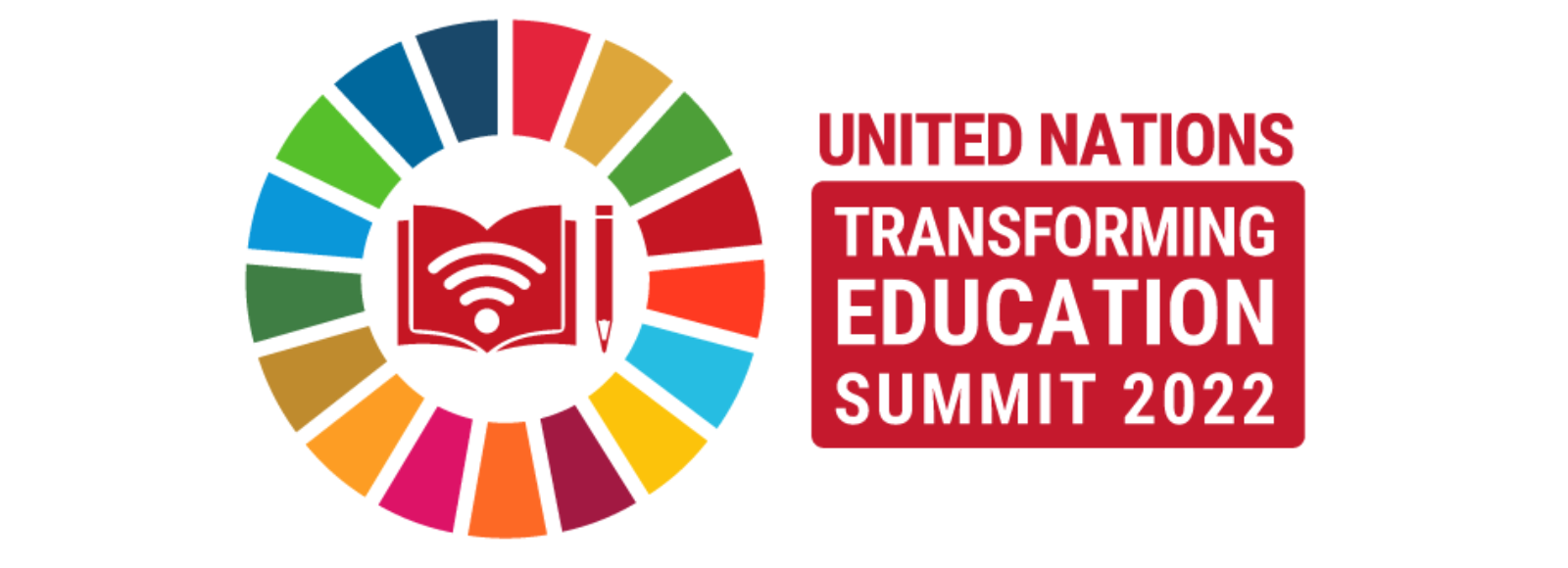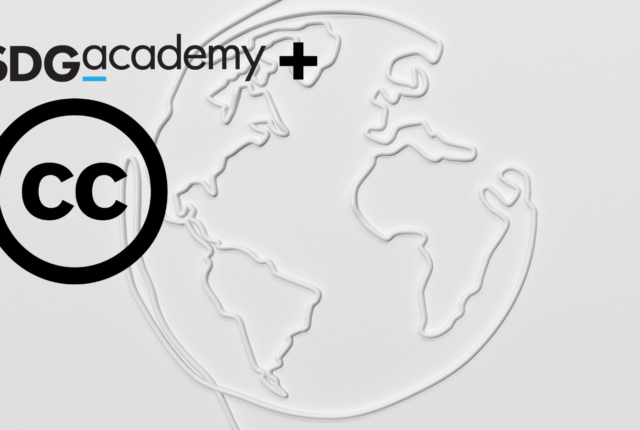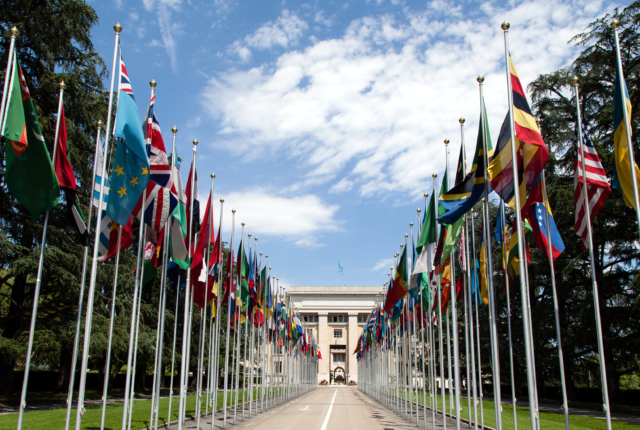By Patrick Paul Walsh, Vice President of Education, Sustainable Development Solutions Network, and Director, SDG Academy
“Education is the most powerful weapon which you can use to change the world”
-Nelson Mandela
Summary: Providing education as a public good is the key to achieving the entire UN 2030 Agenda. The UNGA Transforming Education Summit (TES) in September 2022 is a critical meeting for revitalizing national and global efforts to transform education so that all people have the skills and knowledge to induce peace, human dignity for all, and care for our common home. We argue that Open Education Resources (OER) is key to be able to deliver education for sustainable development as a global public good. The International Commission on the Futures of Education recognizes that OER are also essential for supporting educators, students, and young professionals on their ESD teaching and learning journeys.

The UNESCO Recommendation on OER was endorsed by all member states in November 2019. OER are learning, teaching, and research materials in any format or medium that reside in the public domain or are under copyright, which have been released under an open license that supports the protection of the intellectual property of the creator and at the same time, permits no-cost access, re-use, re-purpose, adaptation, or redistribution by others. OER can support quality education that is equitable, inclusive, open, and participatory, as well as enhance academic freedom and professional autonomy of teachers by widening the scope of materials available for teaching and learning. The Recommendation addresses five objectives: (i) building capacity of stakeholders to create, access, re-use, adapt and redistribute OER; (ii) developing supportive policy; (iii) encouraging inclusive and equitable quality OER; (iv) nurturing the creation of sustainability models for OER; and (v) facilitating international cooperation. Recommendation on Open Educational Resources (OER) | UNESCO
Education for Sustainable Development
Almost seven years ago, the UN 2030 Agenda for Sustainable Development was approved. The level of support for this ambitious agenda helped fuel optimism and a belief that these goals really were achievable by 2030. However, even discounting the major global crises that have occurred, delivery on the SDGs has been sluggish. One of the greatest impediments to progress is the lack of education in the population at large and in leadership positions in government, corporates, academia, and civil society. Globally, education for sustainable development (ESD) remains deficient, and it has been identified as a focus area for the Transforming Education Summit (TES) that the UN Secretary-General has convened for this year’s General Assembly in September 2022. “The Summit seeks to mobilize political ambition, action, solutions and solidarity to transform education towards sustainable development: to take stock of efforts to recover pandemic-related learning losses; to reimagine education systems for the world of today and tomorrow; and to revitalize national and global efforts to achieve SDG-4.”
UNESCO is the lead UN agency on ESD and has an ESD for 2030 framework to “mobilize education to address the [Sustainable Development Goals (SDGs)] and provide everyone with the knowledge, skills, values and attitudes to generate transformative change for sustainable development.” UNESCO launched an ESD for 2030 Network in 2022 that will closely connect to the GAP Programme (2015 to 2019) and the ESD for 2030 Roadmap, while taking on board the recommendations of the UNESCO World Conference on Education for Sustainable Development Declaration (adopted in Berlin in May 2021). UNESCO calls for a new social contract on education to better meet the needs and expectations of future generations.
The SDG Academy (SDSN’s flagship education initiative) is mandated to create and curate the best available educational content on sustainable development and make it available as a global public good. Initially, the focus was on higher education institutions (HEIs), but the focus now is on the continuum of sustainable development education from pre-school into a lifelong learning and practice. The mission of the SDG Academy (closely aligned to SDG Target 4.7) is to promote education pathways that will help learners to acquire the tools, skills, and knowledge to promote sustainable development at all stages of life.
SDG 4, Target 7: “By 2030 ensure all learners acquire knowledge and skills needed to promote sustainable development, including among others through education for sustainable development and sustainable lifestyles, human rights, gender equality, promotion of a culture of peace and non-violence, global citizenship, and appreciation of cultural diversity and of culture’s contribution to sustainable development.”
HEIs are still a key actor in this mission as they are at the center of an intergenerational transfer and creation of knowledge for sustainable development. In addition, HEIs are responsible for training teachers and creating curricula in schools. Finally, HEIs also engage in upskilling of corporates and work within science–policy–practice interfaces. HEIs can and should be a key part of building SDG 4 capacities and pathways within and across nations at all stages of lifelong learning.
In 2020, the SDG Academy and Global Schools launched the global initiative Mission 4.7 in partnership with UNESCO, the Ban Ki-moon Centre for Global Citizens, and the Center for Sustainable Development at Columbia University. Mission 4.7 brings together leaders from government, academia, civil society, and business to accelerate the implementation of Transformative Education for Sustainable Development around the world and highlight the critical importance of education in achieving the SDGs. (The Mission 4.7 website also lists important ESD events).
Mission 4.7’s vision is a world in which the SDGs are achieved through the efforts of educators and practitioners (in government, corporates, and civil society) by providing them with the relevant educational content and fostering partnerships to advance sustainable development everywhere. Ideally, at every stage of life, individuals should understand how they coexist in harmony with people and planet. We may not wish to harm people, or our common home, but all of us must “go back to school” and learn how to create positive linkages to people and nature in our everyday activities. Not only will this secure a much-improved life support system for today’s people, but it also will secure a sustainable future for tomorrow’s people.
ESD is the key to achieving sustainable development through the following 6 SDG transformations:
- education, gender, and inequality
- health, well-being, and demography
- energy decarbonization and sustainable industry
- sustainable food, land, water, and oceans
- sustainable cities and communities
- digital revolution for sustainable development
Drawing on earlier work by The World in 2050 initiative, SDSN has introduced the above six SDG transformations as modular building blocks of SDG achievement. Each transformation identifies priority investments and regulatory challenges, calling for actions by well-defined parts of government working with business and civil society. None of these transformations can be operationalized if every individual in governments, corporates, and civil society has little exposure to ESD and little experience to put learnings into practice in their sphere of influence. Hence, the first transformation above (education, gender, and inequality) is the necessary condition to achieve the other five.
UN GA Transforming Education Summit (TES)
This is an important year for transforming education. The key event is the Transforming Education Summit in New York during the 77th UN General Assembly. There was a successful pre-summit run by UNESCO in Paris from 28 to 30 June 2022. The pre-summit’s objective was to inform the UN Secretary-General’s call to action that will mobilize ministers and leaders of all countries, using SDG 17 partnerships, to transform education systems into teaching and learning spaces that show how to care for people and planet in a sustainable peace. As the UN Deputy Secretary General Amina J. Mohammed said at its conclusion, the transformation should “drive recovery, SDG acceleration and reimagine education for the future.”
One of the central messages to emerge was that education should be considered a global common good. There needs to be greater world-wide, collective responsibility to bring high-quality education to everyone, giving everyone the opportunity to fulfil their capabilities. And free, digital access will be a primary means to deliver it. In these circles, the concept is called Open Educational Resources (OER): it was the topic of several important side-events, including one co-hosted by SDSN; UNESCO has created a cross-sectoral initiative to help drive progress (see OER Dynamic Coalition).
Recognizing that education is a human right and a foundation for peace, tolerance, other human rights, and sustainable development, the United Nations (UN) Secretary-General is convening world leaders for a Transforming Education Summit (TES) on Monday 19 September 2022, as a key milestone in the advancement of Our Common Agenda. “The Summit will be preceded by engagements on Mobilization and Solutions on Friday, 16 and Saturday, 17 September respectively, in which ministerial-participation is encouraged.” The UN TES will spotlight five areas (“Thematic Action Tracks”) that require greater attention and action to accelerate progress on the education 2030 Agenda and transform education:
- Inclusive, equitable, safe, and healthy schools
- Learning and skills for life, work, and sustainable development
- Teachers, teaching and the teaching profession
- Digital learning and transformation
- Financing of education
During the UNGA Transforming Education Summit (TES) on Solutions Day September 17th we address Thematic Action Track 4, Digital learning and transformation, with a session on “Transforming ESD—Implementing the UNESCO OER Recommendation within Multi-Stakeholder Partnerships” Co-organized by SDSN (SDG Academy- Secretariat of Mission 4.7), The Permanent Mission of Ireland to the UN. This session announces actions and investments by stakeholder partners to implement the UNESCO Open Education Resource (OER) Recommendation in support of education for sustainable development (ESD). This session will demonstrate the importance of creating Diamond OERs that comply with the FAIR Principles, meaning that they are: Findable, Accessible, Interoperable and Reusable. These resources may then be shared through Open Educational Resources Repositories (OERRs) that can be used in ESD and training at any stage of life, in any corner of the planet. Our initiative is to create educational resources for sustainable development that are free, openly licensed, easily accessed and can be repurposed. This global repository of quality OER is essential if education is to be truly a Global Public Good.
In the guidelines for National Statements of Commitment, members are asked for a commitment to steering the digital transformation for just and equitable learning including; “Are there initiatives in your country to create, curate, and maintain free, open, curriculum-aligned digital resources and platforms as part of the digital commons? Who is in charge? What entity oversees it, and are they sufficiently resourced?”
We are aligned to the following Recommendation in the Thematic Action Track 5: Recommendation 1: Build and maintain robust, free, public digital learning content and platforms.
Our Approach is aligned to the following principles; Principle 1: Center the most marginalized, Principle 2: Free, high-quality digital education content, Principle 3: Pedagogical innovation and change.
We are also aligned to the following statements in the Thematic Action Track 5: “Digital technologies in education can contribute to wider systemic efforts to improve learning for all by: increasing access to high quality, contextually relevant, curriculum-aligned content for all, including the most marginalized; Empowering teachers by providing them high quality professional development opportunities and supporting their work with students.”
We are particularly aligned to this statement: “Finally, there is the challenge of protecting education, information and knowledge as human rights and public goods, not mere consumer goods that are bought and sold, according to market logics. As the UN Special Rapporteur has pointed out, the digital transformation of education has shown a troubling correlation with the privatization of education and private governance of users’ data and online practices. While the private sector produces and disseminates important digital innovations, it rarely does this equally. Innovations tend to reach and benefit only advantaged communities of learners and teachers. This was particularly true during the rapid expansion of private sector involvement in education during the COVID-19 pandemic. Keeping education at the service of humans and the public good remains a key challenge if the educational potential of technology is to be fully realized. With appropriate governance and regulation, it is possible to protect education as a basic human right and a public good while also leveraging the capacities of the private sector to accelerate and improve digital learning.”
The partnership will make an announcement of a formal action and investments into this ambitious and large-scale initiative. The reality is that the necessary technology, standards, identifiers and open licenses and curricula already exist. The challenge is to coordinate the partnership and repurpose current spending in partners. There will still be a need to fund the transition or set up costs towards what is a sustainable project.
Action 1. A publicly-owned, centralized national platform for Diamond FAIR OERRs will be set up by HEIs libraries, Ireland. The public platform will host OER collections that are committed to peer review, high standards of approvals, standard open licensing, and participatory governance.
Action 2. Creative Commons will provide the open licenses that make OER re-usable, training on how to use them, direct support for governments implementing the UNESCO Recommendation on OER, and open licensing integration in Diamond FAIR OERRs.
Action 3. UN Library will create the meta data and SDG taxonomy for the collection that will standardize the collection to be hosted across the UN Libraries across members countries.
Action 4: Global Schools/SDG Academy/Mission 4.7 will commit their Collections a pilot project hosting FAIR-compliant ESD collections in open source, openly licensed FAIR-supportive OERRs and transferring the collection to the UN Library and IFLA members so that they can be repurposed, localized and translated for use in ESD and Training in any part of the world.
Action 5: UNAI/SDSN/IAU will issue a toolkit for academics to contribute to the ESD Collection that is committed to peer review, high standards of approvals, standard open licensing, and participatory governance. Intellectual property and alt analytics on use will be cited and reported. Education resources need to be free to create and use if education is to be truly a Global Public Good.
Action 6: The IFLA/UNESCO Public Library Manifesto proclaims UNESCO’s belief in the public library as a living force for education, culture, inclusion and information, as an essential agent for sustainable development, and for individual fulfilment of peace and spiritual welfare through the minds of all individuals. In July 2022, IFLA and UNESCO announced the launch of an updated Manifesto, which now emphasizes the public library’s role in helping all members of society access, produce, create, and share knowledge – including through the promotion of open access to scientific knowledge, research and innovations. This side event will feature an official launch of the newly updated IFLA/UNESCO Public Library Manifesto at the UN level – highlighting how libraries working both within their communities and with the formal education system are essential partners for transforming education for sustainable development.
Action 7: 2U will launch corporate training programs that embed Diamond FAIR OERs that create rent sharing opportunities and sustainable finance for collections. Governments, HEIs Libraries and Households by keeping the IP not only save millions on providing ERs for Schools and Universities but can extract rent when commercialized in the private sphere.
Governments, HEIs Libraries and Households by keeping their Intellectual Property on OER not only save millions on providing education resources for Schools and Universities, but they can also extract rent when commercialized in the private sphere. This publicly owned infrastructure will lead to investments and innovation in education beyond the public sphere.
“Efforts to operationalize these three principles will require multi-sector and whole-of-society approaches and should be guided by the UN Secretary General’s Roadmap for Digital Cooperation. That means countries should adopt a multi-sectoral, trans-government approach to education broadly and specifically to digital transformation in learning–this will allow for the harnessing of investment, implementation capacity, and expertise beyond the public sector.”
Conclusion
When partnerships implement the UNESCO Recommendation on OER, using Diamond FAIR OERRs, the world moves closer to reaching fundamental human rights in SDG4 and the UN Declaration of Human Rights Article 26.
References
Walsh, Patrick Paul (2021) The Global Science Commons and Sustainable Development. IAU Horizons 26(2):32-33. Available at: https://www.iau-aiu.net/IMG/pdf/iau_horizons_vol_26_2.pdf. Accessed 2 Mar 2022
Mark D. Wilkinson; Michel Dumontier; IJsbrand Jan Aalbersberg; et al. (15 March 2016). “The FAIR Guiding Principles for scientific data management and stewardship”. Scientific Data. 3 (1): 160018. doi:10.1038/SDATA.2016.18. ISSN 2052-4463. PMC 4792175. PMID 26978244.
Science Europe Social Science Committee. “Social Sciences Committee Opinion Paper: The Need for ‘Diamond Engagement’ around Open Access to High-Quality Research Output” (2015). Science Europe.

Click here to watch the recording of the event.
| Moderator | Donal Kenneally, First Secretary Permanent Mission of Ireland | ||
| Time | Duration (minutes) | Presenter/Speaker (Name, title and country/ organization) | Content (topic, outline) |
| 16:30-17:00 | 30 mins | Tawfik Jelassi, Assistant Director-General for Communication and Information, UNESCO Dr. Yaw Osei Adutwum- Minister for Education, Ghana Niki Kerameus, Minister of Education and Religious Affairs, Greece Jeffrey Sachs, University Professor at Columbia University and President of SDSN Tan Sri Dr. Jeffrey Cheah, Founder & Chairman, Sunway Group, Co-Chair of Mission 4.7 | Opening Remarks |
| 17:00- 17:05 | 5 mins | Brighton Kaoma, SDSN Youth | Youth Voice |
| 17:05-17:11 | 6 mins | Patrick Paul Walsh, University College Dublin and Vice President for Education at SDSN Niamh Brennan, Trinity College Dublin and OpenAlRE | Commitments and Investment into FAIR OERRs Platform |
| 17:11-17:17 | 6 mins | Zeynep Varoglu, Programme Specialist, Digital Innovation and Transformation Section, Communication and Information Sector, UNESCO Cable Green, Director of Open Knowledge, Creative Commons | OER Recommendation and Commitments on Open Licenses |
| 17:17-17:23 | 6 mins | Jayashri Sarah Wyatt | Chief, Education Outreach Section, United Nations Academic Impact Trine Jensen, Manager Digital Transformation in and of Higher Education at the IAU Radhika Iyengar, Earth Institute, Columbia University and SDSN Networks. | Commitments on Curriculum Development and Education by HEIs |
| 17:23-17:29 | 6 mins | Thanos Giannakopoulos, Chief, Dag Hammarskjöld UN Library Claire McGuire, Policy and Research Office, International Federation of Library Associations and Institutions (IFLA) | Commitments on Global Standards and access to Collections across Libraries |
| 17:29-17:35 | 6 mins | Amanda Abrom, Program Manager, Global Schools Kenza Khallafi, Mohammed VI Foundation for Environmental Protection, Mohanned VI John Schwartz, Head Of Business Development edX/2U Michael Richey, Chief Learning Scientist, Leadership, Learning and Organizational Capability, The Boeing Company | Applications in Public and Commercial Spheres |
| 17:35-18:00 | 25 mins | All Speakers | Q&A |


